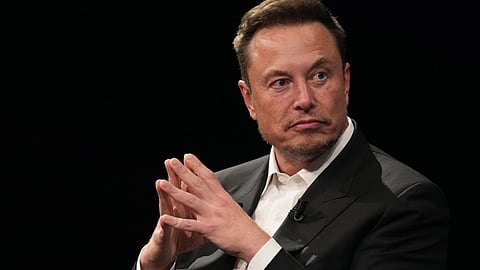Elon Musk slams Malema, questions Ramaphosa over controversial chant
Billionaire CEO Elon Musk has criticised South African politician, Julius Malema for his controversial chant at a recent EFF rally. The chant, popularised in the 1990s, has sparked debate over its meaning and potential implications. Musk, born in South Africa, questions the President's silence and raises concerns about the calls for violence. Malema's party, the Economic Freedom Fighters, advocates radical policies, gaining popularity and financial support. As tensions rise, the nation faces an uncertain political future with potential coalition prospects.
Sign up for your early morning brew of the BizNews Insider to keep you up to speed with the content that matters. The newsletter will land in your inbox at 5:30am weekdays. Register here.
Elon Musk Wades Into South African Politics With Post Blasting Controversial Chant
By S'thembile Cele
Elon Musk, the billionaire chief executive officer of X Corp., castigated South African politician Julius Malema over a controversial chant he made at a rally attended by tens of thousands of his party's supporters over the weekend.
The chant "kill the boer, kill the farmer" made by Malema was popularized in the 1990s by Peter Mokaba, a former youth leader of the African National Congress, which has led the country since the end of White-minority rule in 1994. Mokaba, who died in 2002, argued that the call shouldn't be literally interpreted, but was a metaphor for taking a stand against apartheid, and last year South Africa's Equality Court ruled that it didn't amount to hate speech.
"They are openly pushing for genocide of White people in South Africa," Musk, who was born in Pretoria and emigrated at the age of 17, said in a post on X, the social media platform formerly known as Twitter. He questioned why President Cyril Ramaphosa has failed to speak out.
Malema, who founded the Economic Freedom Fighters a decade ago after the ANC expelled him for bringing it into disrepute, has a long history of making radical statements. His party, South Africa's third-largest, advocates for the nationalization of all land and the redistribution of wealth to the Black majority, policies that have resonated with many poor township residents whose standard of living has improved little since apartheid ended. It won 11% of the vote in the last national elections four years ago.
While a poll of 1,517 registered voters published in March by the Social Research Foundation showed the EFF's share of the vote could sink to as low as 6%, other surveys indicate that it retains the backing of more than 10% of the electorate. Opinion polls also show the ANC risks losing its outright majority in next year's elections — and if it does there is a prospect it could enter into coalition with EFF to retain power, as it has done in a number of municipalities.
The EFF's popularity and financial muscle were on stark display at its 10th anniversary rally, when it packed out out the 94,736-seat FNB Stadium in Soweto, near Johannesburg, on July 29. Several top bands performed at the event, which culminated with Malema being raised into the air on a platform at the end of his address to wild applause.
"We are taking government in 2024," Malema told the crowd. "The revolution in South Africa is guaranteed."
Malema adopted a more conciliatory tone in a meeting with diplomats on July 28, saying South Africa would remain open for business when his party takes power and privately owned mines and banks won't be shut, but that the country needed to be dealt with on "equal terms."
"With the European Union, don't ask what will we ask from you," he said in reply to a question from Spain's ambassador to South Africa on how he foresaw future relations with the bloc. "That is a big brother mentality. What are you going to ask from us? We are not asking for anything, we are fine. Let us relate as equals, not as a beggar and a big brother supplier."
Malema also warned the US not to threaten to withdraw the preferential market access South Africa enjoys under the African Growth and Opportunity Act in response to it maintaining relations with Russia and its leader Vladimir Putin.
"You can't use AGOA to threaten us in terms of our sovereignty and foreign policy," he said. "You can do away with AGOA. We will remain with our sovereignty."
Read also:
© 2023 Bloomberg L.P.

